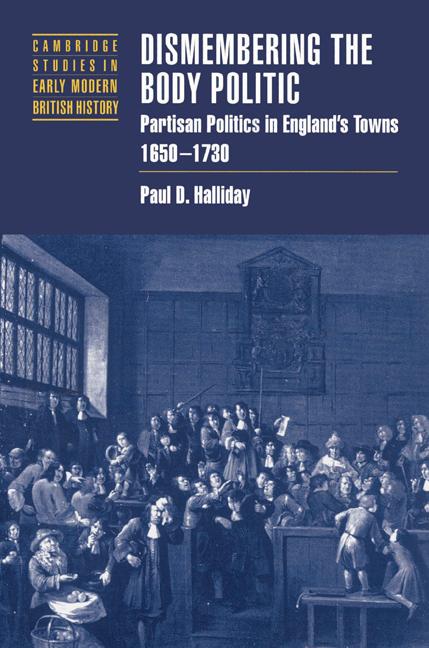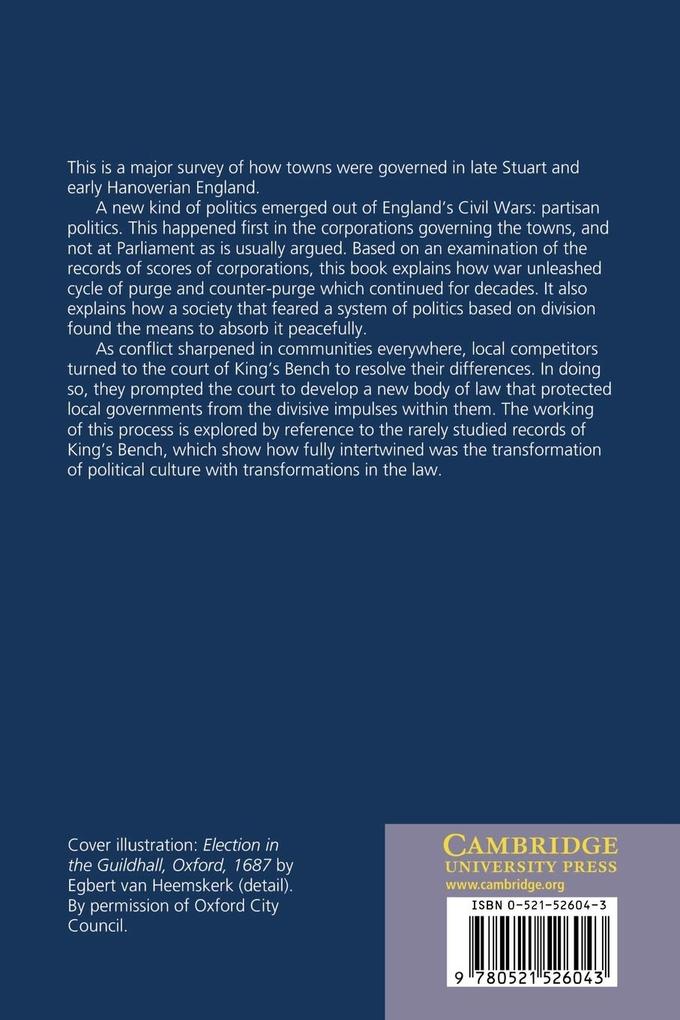
Zustellung: Do, 12.06. - Mo, 16.06.
Versand in 6 Tagen
VersandkostenfreiBestellen & in Filiale abholen:
This is a major survey of how towns were governed in late Stuart and early Hanoverian England. England's civil wars in the 1640s broke apart a society that had been used to political consensus. Though all sought unity after the wars ended, a new kind of politics developed--one based on partisan division, arising first in urban communities, not at Parliament. This book explains how war unleashed a long cycle of purge and counter-purge and how society found the means to absorb divisive politics peacefully. Legal changes are explored with reference to the rarely-studied court records of King's Bench, to which local competitors turned for help in resolving their differences.
Inhaltsverzeichnis
Preface; List of abbreviations; Part I. Corporate Ideal and Partisan Reality: 1. The paradox of partisan politics; 2. 'The best of politics'; 3. From purge to purge: Civil War, Interregnum, and Restoration in the corporations; 4. Partisan politics, 1663-1682; Part II. The King and his Corporations, 1660-1688: 5. The corporations and their charters, 1660-1682; 6. Quo warranto and the King's corporations, 1682-1685; 7. Revolution in the corporations, 1685-1688; Part III. Partisan Conflict and the Law in a Dynamic Society: 8. The legacy of the 1680s; 9. Partisan conflict and political stability, 1702-1727; 10. 1660, 1688, 1727, and beyond; Select bibliography; Index.
Produktdetails
Erscheinungsdatum
18. Juni 2002
Sprache
englisch
Seitenanzahl
416
Autor/Autorin
Paul D. Halliday
Herausgegeben von
Anthony Fletcher, John Guy
Verlag/Hersteller
Produktart
kartoniert
Gewicht
672 g
Größe (L/B/H)
229/152/24 mm
ISBN
9780521526043
Entdecken Sie mehr
Pressestimmen
"Paul D. Halliday's book offers a new insight into the electoral politics of corporate English towns in the unstable decades of the English monarchy between the execution of King Charles I and the confirmation of the Hanoverian succession. The importance of his work lies in the fact that corporate towns elected most of the members of parliament in these decades. My estimate is that Halliday's work needs to be read by political historians of England. Those interested in parliament and party, and urban historians, should buy it...a well-planned and well-argued book. It is easy, even compelling to read. It places more emphasis on local initiatives in politics, and if the approach is accepted, then Charles II and James II emerge as lesser demons in corporation history than has hitherto been claimed." The Journal of Modern History "...Halliday's study provides a useful complement to the pioneering work on the emergence of partisan politics..." Choice "This is an important book and should be studied by anyone interested in the impact of partisan politics on the body politic." Richard G. Bailey, Canadian Journal of History
Bewertungen
0 Bewertungen
Es wurden noch keine Bewertungen abgegeben. Schreiben Sie die erste Bewertung zu "Dismembering the Body Politic" und helfen Sie damit anderen bei der Kaufentscheidung.










